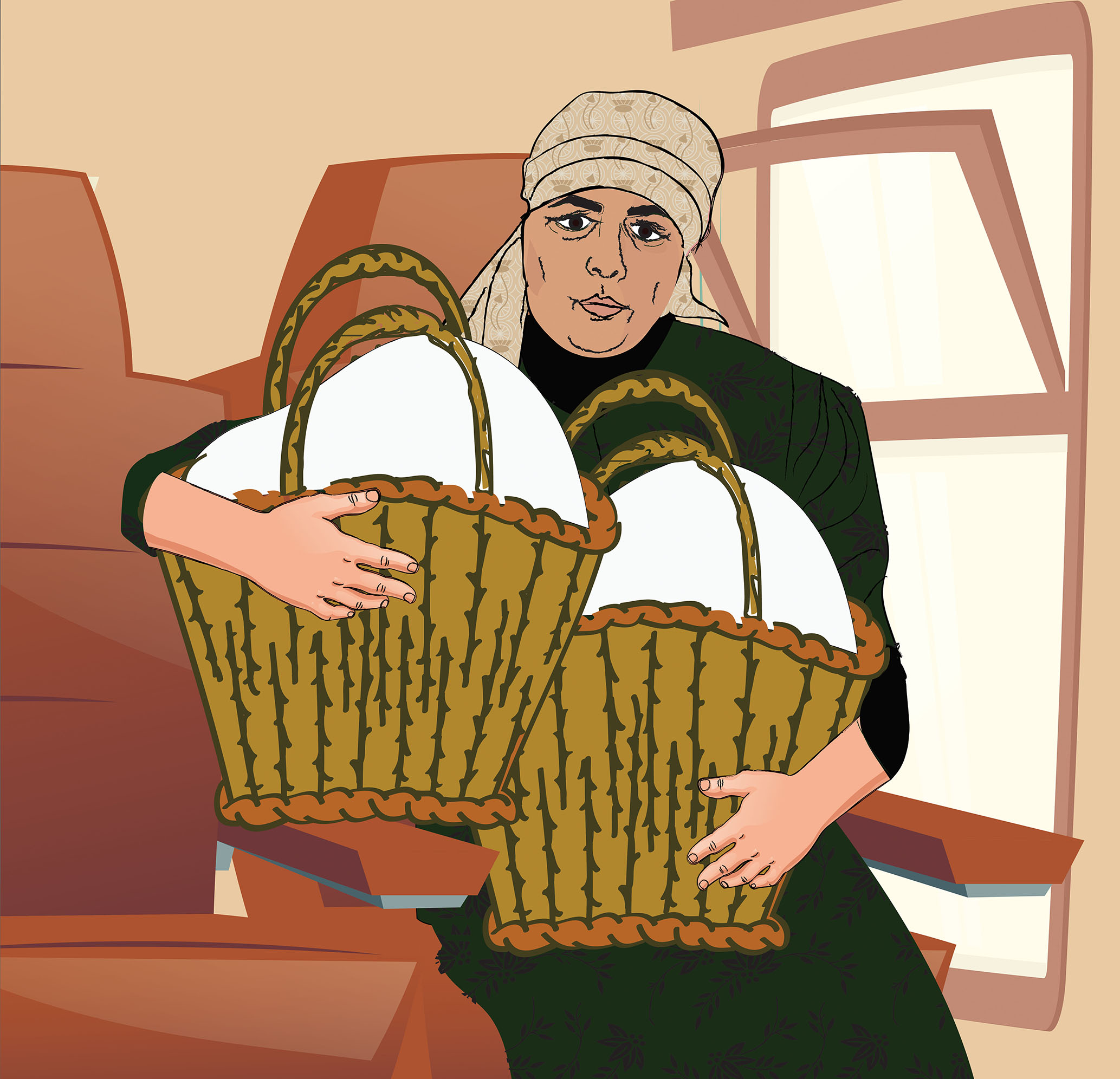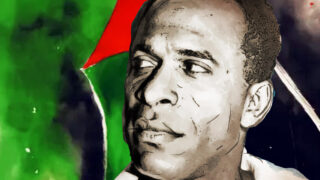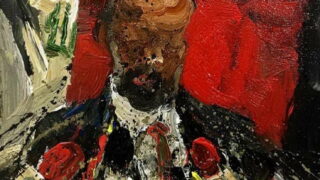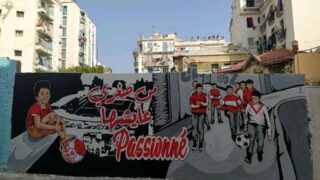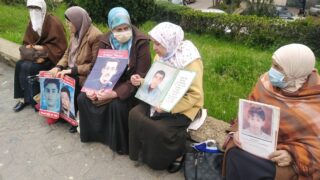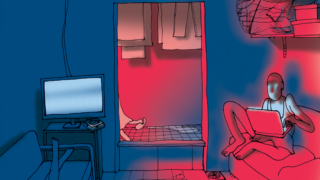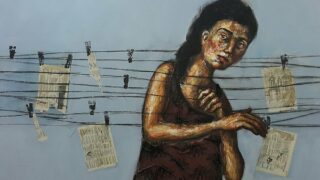
This publication has benefited from the support of the Rosa Luxemburg Foundation. This text may be reproduced in part or in full, provided the source is acknowledged.
Mother and daughter arrive, each conscious of her steps. The mother is suffering from back pain, severe pain. In a cafe in the capital Algiers, we barely have a chance to sit and sip the freshly squeezed orange juice before Fatima M., the mother, breaks into tears. She cries from the bottom of her heart: “This is my life we’re talking about. I feel sorry for myself.” She pulls herself together: “Should we start by talking about my childhood, my work, or my marriage?” Already taking charge of the interview she adds, “I’ve been wanting to tell my story for so long.”
Her story is that of a life of daily tyranny and exploitation of a woman born in 1962 in a poor and barren mountain village to an orphaned mother and a father “whose heart grew cold from a miserable life with my over-controlling mother”. Married at 13, her mother’s life as an orphan made her even tougher.
When Algeria gained independence, Fatima wanted to go to school. When she was 12, she wanted to learn how to read and write. She studied for two years, but her family, namely her mother and brother, had other plans for her. Between the two of them, she says, her life was ruined.
Fatima fought back. Throughout her life, she continued to resist everything that could have crushed her. It was against their will that she continued her education. “I used to read newspapers. I read the same newspapers many times over. I also used to listen to the radio. It never left my side,” she says.
Meanwhile, her many suitors were repeatedly turned down by her family. “If you stay with me, I will cover your arms in gold,” her mother promised. In truth, all Fatima got was beatings to force her to accept her fate, a prisoner in her own home. Her tyrant mother only saw her as a house servant. The mother used to sew blankets for a living, while Fatima was expected to do the rest: cleaning, washing clothes, collecting wood, starting the fire, and hand-rolling couscous. Fatima was always the first to wake up and the last to go to bed.
When her brother got married, Fatima tried to rebel against the status quo, demanding that his wife “take care of her husband and share the housework.” To this her brother would reply, “I will not destroy the home that I’ve built,” the very home in which she was a pillar. She needed to find a way out of that nightmare. That’s when she promised herself: “I swear to God, I will marry the first man who proposes to me.” That man happened to have a disability, “he needed crutches to walk”. But she kept her oath, because she was “a woman of faith,” as she put it. She married him without a wedding party and against her family’s will. Indeed, Fatima was out of the frying pan, into the fire. Her brother’s beatings were replaced by those of her husband, “He used to beat me with his dead feet. In truth, he was not sick in the legs; he was sick in the head.”
When Algeria gained independence, Fatima was a 12-year-old child who wanted to go to school to learn how to read and write. She studied for two years, but her family, namely her mother and brother, had other plans for her. Fatima fought back, and throughout her life, she continued to resist everything that could have crushed her.
Fatima and her husband moved out of her in-laws’ home, who also wanted to exploit Fatima and keep her at their service - another hell to escape. The couple moved from the countryside closer to the capital Algiers in a neighborhood that was somewhere between rural and urban.
At 25, Fatima had already had five children, two girls and three boys. “It’s through children that men make us stay,” she says. With her care, her eldest son grew up to be a distinguished student, “he received the highest grade in the entire wilaya (governorate)”. But his father, who taught in a Quran school, refused to pay his university tuition. Maybe he was jealous of his son who “sympathised with me and felt my pain”. He would promise her: “yamma, I’ll study hard and help you out of this misery”.
When he couldn’t deliver on his promise, “he buried everything deep in his heart and fell silent.” As for the poverty, it only grew louder. “What was I to do? I was drowning in debt,” Fatima says.
“She sold everything”, her daughter added, telling her mother’s story calmly and carefully, “her jewellery, wool blankets, and clay pots. She was left with nothing.” At 20 years old, her daughter was the only one of her children to continue her education - as if to avenge her mother. Today, she’s graduating from university. “[My mother] taught me how to open the doors that I thought were closed shut in my face,” her daughter says.
One day, while Fatima was looking around for something to sell, her eyes fell on a few kilos of couscous that she had hand rolled herself and other traditional doughs that she had prepared to cook for her family. That’s when she had the idea. “I took the three kilos of couscous that I prepared, and two kilos of “Barcoucs” (balls of dough that are called “Mughrabiyeh” in the Levant), and I went down to Martyrs' Square in the capital - because I love this city - and I sold my dough there. People loved it. I’ll never forget some Algerian sisters who encouraged me and helped by placing more orders.
At 58, and for the first time in her life, she discovered that her skills, and the doughs she made, had value and could be monetized. Later, she would find out that they would also break her back, and that her efforts had little value in society’s eye.
A table to stand on
Fatima is one of those women who, when asked by population census workers, “Do you work?” would simply answer, “No”. They would then follow up with a question, “So, you stay home?”, and she would answer, “Yes, gaa’da feddar”. That’s how we put it in Algeria, “I just sit at home”. These women comprise the vast majority of females who only constitute 18% of the total labour force - even if that number is rising.
“She sold everything”, her daughter added, telling her mother’s story calmly and carefully, “her jewellery, wool blankets, and clay pots. She was left with nothing.” At 20 years old, her daughter was the only one of her children to continue her education - as if to avenge her mother. Today, she’s graduating from university. Speaking of her mom she says, “She taught me how to open the doors that I thought were closed shut in my face”.
Sitting at home? The first thing Fatima M. bought with her earnings was an old table so that she could stand up. “This way I can have everything within reach: salt, semolina, water, and oil,” she explained. Her first upgrade was inventing her own workbench. Sitting at home? “I work all night. When everyone sleeps, I work from nine at night to midnight. I roll couscous, cook it, weigh it, and put it in my baskets. Then I prepare my cakes and let them rest while I go to sleep. At four in the morning, I get up again to bake them one tray at a time. When they arrive at the market, they’re fresh and warm.”
That’s not even the hardest part: moving kilograms of goods from her village in the mountains to the nearest city that has public transport. From that city, Fatima heads to the central station, where she takes a train to Algiers. “God knows how I used to transport all those goods to the market! When it rained, I couldn’t even carry an umbrella because my hands were full, a basket in each hand. People would say that I am a true moujahida,” she says without smiling.
Fatima would leave her house at 6:30 am to arrive in Algiers at 9:30, a three-hour trip. Then she arrives at Agha Station in the capital, where another obstacle awaits: climbing up the hill while carrying her baskets, for Algiers is a city of slopes. She has to do this a few times over. “I would ask people to watch some of my stuff while I deliver what I can carry in one round to the market,” she says.
But Fatima doesn’t complain. Her business does well, and she can’t even keep up with the orders. She has become a role model to her neighbours. As destitute as they are, they proposed providing her with some baked goods for her to sell at a commission. She agreed. Together, they’ve truly formed a women-only workshop. Each preparing her specialty. One of them makes date cakes, another home-made bread, and the youngest among them makes puff pastries, which are exhausting to prepare. They make a living out of their “feminine” skills that have always been unpaid, undervalued, and derided.
Another table for visibility
Fatima succeeded at the feat of having her own stall to display her goods at the corner of the street and on the pavement in the market formerly known as Meissonnier. It’s a rare thing in Algeria, where women don’t usually mix with men in the market, which is still considered a strictly male-dominated space.
That’s how we put it in Algeria, “gaa’da feddar,” or “I just sit at home.” These women form the vast majority of females who only constitute 18% of the total labour force - even if that number is rising.
And even if this is an unwritten rule, there will no doubt be a man there to remind her of it and attempt to impose it upon her. Fatima recalls, “A young man once harassed me at the market, telling me that ‘not even men with moustaches can get this spot, so you shouldn’t be here! Dégage!’ But he didn’t scare me. I stayed put.”
Conflict is inevitable in a country where unemployment is on the rise, in light of a transition from a command economy to a neoliberal one, reinforced by the structural adjustment plan of 1994, which expels men and women from the formal labour market and into competition with one another. They become “naviguers”, as we say in Algeria, navigating the world, seeking work, and fending for themselves by crossing the lines between legality and invisibility. A grey market thus expands by the day. The “National Social and Economic Council” estimates that this informal market has employed more than 1 million and 249 thousand people in 2003 (which is equal to the number of workers in the agricultural sector), making up 17% of the total labour force - which is growing by 8% on average every year, at double the growth rate of the formal labour market (1).
For every one woman in this market, there are four men. These numbers don’t reflect the reality on the ground according to the International Labour Organisation (ILO) which estimates that informal labour constitutes 43% of the total workforce in Algeria, with women making up double the number set by official estimates (2). In any case, all figures indicate one thing: that given staggering unemployment rates, the future of female employment lies in the informal market - invisible socially, economically, and legally.
However, Fatima doesn’t complain. She relies on “God and her muscles”, since she has never been as independent and as “rich” as she is today. Depending on the day, her income fluctuates between 2,500 to 5,000 Algerian Dinars per day - about a quarter of what her husband makes per month.
“I went down to Martyrs' Square and I sold my dough. People loved it. I’ll never forget some Algerian sisters who encouraged me and helped me by placing more orders.” At 58, and for the first time in her life, Fatima discovered that her “feminine” skills, which have always been unpaid, undervalued, and derided, have value and can be monetized.
She would leave her house at 6:30 am to arrive to Algiers at 9:30, a three-hour trip. Then, she would arrive to Agha station in the capital, where another obstacle awaits: climbing up the hill while carrying her baskets, for Algiers is a city of slopes.
“You can’t begin to imagine my joy when I get home and begin to bake. When my husband wants to know how much money I made, I just tell him: Don’t ask! I’ve become independent, alhamdullilah,” Fatima beams.
But, even if she beat the odds, Fatima’s body can no longer keep up: “I’ve been pushing myself too much. I’m tired, my God, oh, my God!” Barely three years after she started this work at this debilitating rate, her back is torn, forcing her to leave the market without rights or compensation.
And without regrets, either... Fatima tells me how this work has lifted her out of poverty. Her face lights up for the first time since we’ve met, “I just bought a baking oven. I was so happy, as if I had just bought a helicopter. I also bought my daughter an electric sewing machine, and I have enough money to buy a fridge,” before she adds with a coy smile that suddenly makes her seem ten years younger, “and I bought myself a pair of earrings, too”.
The content of this publication is the sole responsibility of Assafir Al-Arabi and Rosa Luxemburg Foundation cannot accept any liability for it.
Translated from Arabic by Serene Husni
Published in Assafir Al-Arabi on 21/03/2020
1- “Ampleur et nature du travail informel en Algérie : Essai d’analyse par genre” (The Extent and Nature of Informal Work in Algeria: A Gender Analysis), by Boutaleb Kouider and Dahmani Driouche.
2- Ibid.

